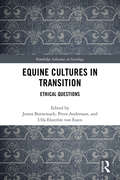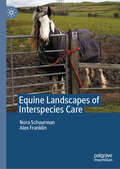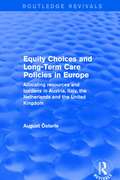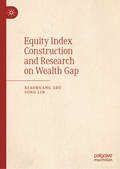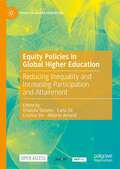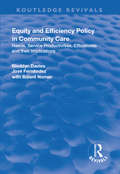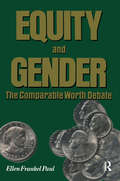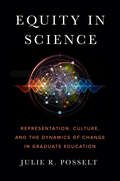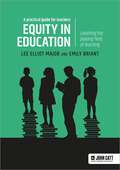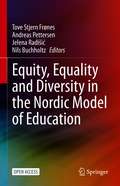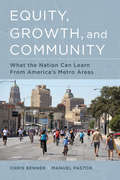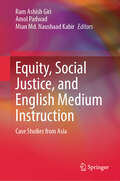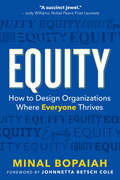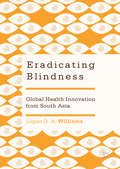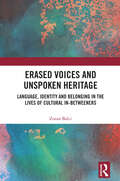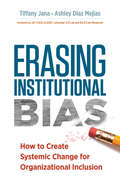- Table View
- List View
Equine Cultures in Transition: Ethical Questions (Routledge Advances in Sociology)
by Jonna Bornemark Petra Andersson Ulla Ekström von EssenSocietal views on animals are rapidly changing and have become more diversified: can we use them for our own pleasure, and how should we understand animal agency? These questions, asked both in theoretical discourses and different practices, are also relevant for our understanding of horses and the human–horse relation. Equine Cultures in Transition stands as the first volume to bring together ethical questions of the new field of human–horse studies. For instance: what sort of ethics should be developed in relation to the horse today: an egalitarian ethics or an ethics that builds upon asymmetrical relations? How can we understand the horse as a social actor and as someone who, just like the human being, becomes through interspecies relations? Through which methods can we give the horse a stronger voice and better understand its becoming? These questions are not addressed from a medical or ethological perspective focused on natural behaviour, but rather from human acknowledgement of the horse as a sensing, feeling, acting, and relational being; and as a part of interspecies societies and relations. Providing an introductory yet theoretically advanced and broad view of the field of post humanism and human animal studies, Equine Cultures in Transition will appeal to students and researchers interested in fields such as human–animal studies, political sociology, animals and ethics, animal behaviour, anthropology, and sociology of culture. It may also appeal to riders and other practitioners within different horse traditions.
Equine Landscapes of Interspecies Care
by Nora Schuurman Alex FranklinThis book focuses on the spaces and practices of caring for horses, explored in a series of case studies set across the equine lifespan. For horses, everyday practices of care as well as ever-changing understandings of what is good care directly shape their living conditions and lives with humans. In this book, questions of animal ethics and welfare are approached in a tangible way by exploring the relationships and practices of interspecies care across a range of different spaces, including horse yards, training grounds, farms, rescue centres and the street. The chapters illuminate the ways in which interspecies care ties horses to human society and culture, addressing care practices in different stages of the equine life cycle. Through a unique set of case-studies addressing issues such as training, working, rescue, aging and death, the book offers a clear overview of how humans shape the lifespan of animals living under their care. It simultaneously foregrounds the agency of animals in this process and how such agency is interpreted and responded to by humans. With its theoretically solid analysis of rigorous empirical study, the book answers the need to understand human connection to the nonhuman world within the everyday practices and spaces of contemporary society and culture.
Equity Choices and Long-Term Care Policies in Europe: Allocating Resources and Burdens in Austria, Italy, the Netherlands and the United Kingdom (Routledge Revivals)
by August OesterleThis title was first published in 2001: Employing an interdisciplinary and comparative approach to equity in long-term care, this book addresses the fact that demographic changes leading to ageing populations, financial pressures and changes in traditional support systems have brought long-term care and the redesign of care systems to the top of the European social policy agenda. Despite the importance of this issue, however, the question of equity in long-term care has until now received relatively little attention in social policy research. Rather than focusing on theories of social justice or the analysis of specific interpretations of equity, this book develops key dimensions of equity choices in a framework for systematic comparative analysis. This tool is then used to investigate long-term care policies in Europe, exploring equity choices in both the provision and the finance of long-term care. These choices are discussed comparatively with regard to the implications for the various actors and are also contrasted with basic welfare state objectives. This book represents an important addition to comparative research into several key areas of welfare and welfare state design. It explores the division of responsibilities in long-term care systems between the public and private and formal and informal sectors, the relationships between different welfare state objectives, the different types of welfare state intervention, and the principles and choices surrounding the allocation of resources and burdens.
Equity Index Construction and Research on Wealth Gap
by Xiaohuang Zhu Song LinThis book constructs a Chinese Social Equality Index–the Mongoose Social Equality Index–with the wealth gap index as its core, and the legal equality index, the socio-cultural equality index, and the financial equality index as its supplement. The book focuses on the influence of the wealth gap on economic and social issues. Empirical research shows that there are three turning points in the influence of the wealth gap index on economic growth: discrepancy turning point, golden turning point and destructive turning point. Based on the latest data,the current expected wealth gap index in China has surpassed the destructive point. This means that wealth brought about by economic growth will largely go to the rich, which aggravates inequality and even brings forth a potential economic recession. Meanwhile, the index also indicates that, as the Chinese economy develops, social equality has been on a noticeable decline. This book will be of interest to economists, China watchers, and political scientists
Equity Policies in Global Higher Education: Reducing Inequality and Increasing Participation and Attainment (Issues in Higher Education)
by Alberto Amaral Orlanda Tavares Cristina Sin Carla SáThis book discusses and analyses global policies and practices aimed at promoting equity in higher education participation and attainment. Although the massification of higher education systems has facilitated the participation of students from deprived backgrounds, socioeconomic inequalities persist in access to the most prestigious institutions and programmes. Privileged students benefit from a number of advantages in the competition for selective and scarce places: access to information, lower aversion to debt, higher expectations, better previous schooling and higher academic achievement. The chapters present a critical analysis of equity policies in different countries – with or without affirmative action policies, within a context of neoliberal policies or within a social democratic model – and the reasons why they have failed to promote equity and fairness, preventing students from achieving their full educational potential.This is an open access book.
Equity and Efficiency Policy in Community Care: Needs, Service Productivities, Efficiencies and Their Implications (In Association With Pssru (personal Social Services Research Unit) Ser.)
by Bleddyn Davies José FernándezThis title was first published in 2000: Equity and Efficiency Policy provides a completely new perspective on post-reform community care, analyzes its fairness, effectiveness and efficiency in a new way and uses its powerful new techniques applied to a major national collection of evidence to suggest how to develop the Modernization Agenda. It - describes, for the first time, how differences in the levels of each of the main services alone and in combination affect a wide range of user and carer benefits; - uses this knowledge to analyze in a new way and make policy proposals about some of the pressing policy issues of the government’s Modernization Agenda.
Equity and Gender: The Comparable Worth Debate
by Ellen Frankel PaulComparable worth-the idea that women ought to be paid the same wages as men performing comparable although not the same jobs-has generated a firestorm of controversy. This analysis of the comparable worth debate takes up its pros and cons in an extraordinarily disciplined and fair-minded manner. After outlining the debate, Paul attempts to resolve
Equity in Discourse for Mathematics Education
by David Wagner Beth Herbel-Eisenmann David Pimm Jeffrey ChoppinThis book explores the connection between the ways people speak in mathematics classrooms and their opportunities to learn mathematics. The words spoken, heard, written and read in mathematics classrooms shape students' sense of what mathematics is and of what people can do with mathematics. The authors employ multiple perspectives to consider the means for transformative action with respect to increasing opportunities for traditionally marginalized students to form mathematical identities that resonate with their cultural, social, linguistic, and political beings.
Equity in Health and Health Promotion in Urban Areas: Multidisciplinary Interventions at International and National Level (Green Energy and Technology)
by Alessandra Battisti Maurizio Marceca Silvia Iorio Giuseppe RicottaThe book explores approaches, methods and best practices related to health promotion in urban areas. Thanks to the increasingly tight connection among urbanism, architecture, bioethics, anthropology, sociology and medicine, we are now reaching an “ecological” health perspective. This new viewpoint has pushed the study of social health determinants and their unequal distribution in the population, resulting in the study of the generation of structurally-determined differences in health and healthcare. There is the need to make use of a unitary framework in order to understand the intertwining of multidimensional dynamics that define the urban context and the need to disseminate, enhance, and improve existing interventions in the field. This volume consequently results in the discussion and comparison of contents and methods to be implemented in multidisciplinary interventions related to the promotion of community-based healthcare and health in the urban setting. The book represents a useful opportunity for scientific growth and international sharing of methodologies that can help develop a common language and approach to be shared across different academic spheres. This is not only an exchange of knowledge among different fields of study, but also the creation of foundations for creating an increasingly complex network of scientific culture and operational collaborations to transfer knowledge and attract academic and public attention, influencing decision-makers and gaining advocacy accordingly.
Equity in Science: Representation, Culture, and the Dynamics of Change in Graduate Education
by Julie R. PosseltSTEM disciplines are believed to be founded on the idea of meritocracy; recognition earned by the value of the data, which is objective. Such disciplinary cultures resist concerns about implicit or structural biases, and yet, year after year, scientists observe persistent gender and racial inequalities in their labs, departments, and programs. In Equity in Science, Julie Posselt makes the case that understanding how field-specific cultures develop is a crucial step for bringing about real change. She does this by examining existing equity, diversity, and inclusion efforts across astronomy, physics, chemistry, geology, and psychology. These ethnographic case studies reveal the subtle ways that exclusion and power operate in scientific organizations and, sometimes, within change efforts themselves. Posselt argues that accelerating the movement for inclusion in science requires more effective collaboration across boundaries that typically separate people and scholars—across the social and natural sciences, across the faculty-student-administrator roles, and across race, gender, and other social identities. Ultimately this book is a call for academia to place equal value on expertise, and on those who do the work of cultural translation. Posselt closes with targeted recommendations for individuals, departments, and disciplinary societies for creating systemic, sustainable change.
Equity in education: Levelling the playing field of learning - a practical guide for teachers
by Lee Elliot Major Emily Briant'Comprehensive and groundbreaking.' Dylan WiliamEquity in Education sets out a new equity-based approach in education to help teachers improve the prospects of under-resourced and working-class pupils.The equity approach recognises that we must address our own cultural biases and barriers within the classroom, while helping to remove extra barriers to learning experienced by children outside schools. Based on thousands of research studies and years of working with expert teachers, the book sets out the principles and practical strategies for trainee teachers, teachers and teacher leaders.Adopting an equity mindset involves four key principles:· equity not equality - doing more to overcome the extra barriers some learners experience· capacity not deficit thinking - recognising the talents in all pupils· deep not shallow relationships - developing authentic individual relationships with pupils· multiple not singular talents - acknowledging that human talents come in many forms.Equity in Education also advocates the national policies that would enable teachers to prioritise an equitable approach and reduce divides between the education haves and have-nots.
Equity in education: Levelling the playing field of learning - a practical guide for teachers
by Lee Elliot Major Emily Briant'Comprehensive and groundbreaking.' Dylan WiliamEquity in Education sets out a new equity-based approach in education to help teachers improve the prospects of under-resourced and working-class pupils.The equity approach recognises that we must address our own cultural biases and barriers within the classroom, while helping to remove extra barriers to learning experienced by children outside schools. Based on thousands of research studies and years of working with expert teachers, the book sets out the principles and practical strategies for trainee teachers, teachers and teacher leaders.Adopting an equity mindset involves four key principles:· equity not equality - doing more to overcome the extra barriers some learners experience· capacity not deficit thinking - recognising the talents in all pupils· deep not shallow relationships - developing authentic individual relationships with pupils· multiple not singular talents - acknowledging that human talents come in many forms.Equity in Education also advocates the national policies that would enable teachers to prioritise an equitable approach and reduce divides between the education haves and have-nots.
Equity, Efficiency, and Ethics in Remedies for Breach of Contract: Theory and Experimental Evidence (International Law and Economics)
by Sergio MittlaenderThis book analyzes the conflict that emerges between parties after a breach of contract and how different legal remedies can best reduce conflict. Causes for conflict include equity, efficiency, and ethical reasons that parties might consider and use to blame the other or to justify breach. In the end, if not resolved through apologies or renegotiation, conflict leads to aggrievement and behavioral reactions in form of retaliation by the victim against the promisor in breach. The book provides empirical evidence from laboratory experiments for how individuals react to perceived wrongful acts such as breach of contract and for the function of legal remedies to reduce retaliation by disappointed promisees in providing them compensation. It reveals how the inequality in the outcome, and not the inefficiency of breach of contract, causes aggrievement and retaliation by victims. The book concludes with a comparative law and economic analysis of remedies for breach of contract adopted in different leading jurisdictions, with important normative implications for the American insistence on expectation damages, the French expansion of specific performance with "astreinte", the German junction of specific performance, expectation damages, and disgorgement damages, and the British timid acceptance of partial disgorgement damages.The book will appeal to scholars, researchers, and students of economics and law, interested in a better understanding of remedies for breach of contract.
Equity, Equality and Diversity in the Nordic Model of Education
by Tove Stjern Frønes Andreas Pettersen Jelena Radišić Nils BuchholtzDoes the Nordic model of education still stand by its original principles and safeguard education for all? This Open Access volume is a carefully crafted collection of chapters that investigate the different aspects of equity, equality and diversity across the education systems in the Nordic countries. Based on data from various national and international large-scale assessments, the volume provides a better understanding of both the functions and foundations of the Nordic model, along with how the concepts mentioned above are enacted in practice. Across the chapters, data from different national and international large-scale assessment studies are used for cross- and single-country analyses on a variety of issues related to equity, equality and inequality in diverse educational settings. The investigations address different subject domains (i.e., mathematics, science, reading), age and grade groups, but also issues related to teachers and the schools themselves. In addition to these empirical chapters, the book addresses the theoretical and methodological underpinnings of the ideas and tools embedded in the phenomena of equity and equality and how they have met in the Nordic model of education.
Equity, Growth, and Community: What the Nation Can Learn from America's Metro Areas
by Chris Benner Manuel PastorA free ebook version of this title is available through Luminos, University of California Press's new open access publishing program for monographs. Visit www.luminosoa.org to learn more. In the last several years, much has been written about growing economic challenges, increasing income inequality, and political polarization in the United States. This book argues that lessons for addressing these national challenges are emerging from a new set of realities in America's metropolitan regions: first, that inequity is, in fact, bad for economic growth; second, that bringing together the concerns of equity and growth requires concerted local action; and, third, that the fundamental building block for doing this is the creation of diverse and dynamic epistemic (or knowledge) communities, which help to overcome political polarization and help regions address the challenges of economic restructuring and social divides.
Equity, Social Justice, and English Medium Instruction: Case Studies from Asia
by Ram Ashish Giri Mian Md. Naushaad Kabir Amol PadwadThis book contributes to the existing body of knowledge on English Medium Instruction's (EMI) role in equity and social justice and adds to the ongoing conversation by providing the Asian perspective to it. It showcases scholarly works by scholars and researchers in the field and presents their diverse voices on EMI and social justice in a single volume. This book focuses on different aspects of the issue on EMI, equity, and social justice in different Asian contexts while providing a holistic picture of social justice in English language teaching in the region. It focuses on the current context-specific EMI practices situating them in their historical pretext, employs prevalent theoretical as well as methodological models and approaches to study such practices, considers curricular and pedagogical considerations adapted to address the multitude of needs of EMI, and examines controversies surrounding the conceptualization, plan/policy, and implementation strategies of EMI.
Equity: How to Design Organizations Where Everyone Thrives
by Minal BopaiahA fast and engaging read, Equity helps leaders create more inclusive organizations using human-centered design and behavior change principles.Even the most passionate advocates for diversity, equity, and inclusion have been known to treat equity as the middle child—the concept they skip over to get to the warm, fuzzy feelings of inclusion. But Minal Bopaiah shows throughout this book that equity is critical if organizations really want to leverage differences for greater impact.Equity allows leaders to create organizations where employees can contribute their unique strengths and collaborate better with peers. Bopaiah explains how leaders can effectively raise awareness of systemic bias and craft new policies that lead to better outcomes and lasting behavioral changes. This book is rich in real-world examples, such as managing partners at a consulting firm who learn to retell their personal stories of success by crediting their systemic advantages and news managers at NPR who redesign their processes to support greater diversity among news sources. This slender book expands DEI past human resources initiatives and shows how leaders can embed equity into core business functions like marketing and communications. Filled with humor, heart, and pragmatism, Equity is a guidebook for change, answering the question of how that so many leaders are asking today.
Eradicating Blindness: Global Health Innovation From South Asia
by Logan D. WilliamsThis book describes community ophthalmology professionals in South Asia who demonstrate social entrepreneurship in global health to help the rural poor. Their innovations contested economic and scientific norms, and spread from India and Nepal outwards to other countries in Africa and Asia, as well as the United States, Australia, and Finland. This feminist postcolonial global ethnography illustrates how these innovations have resulted in dual socio-technical systems to solve the problem of avoidable blindness. Policymakers and activists might use this example of how to avoid Schumacher's critique of low labor, large scale and implement Gandhi's philosophy of good for all.
Eradicating Female Genital Mutilation: A UK Perspective
by Hilary BurrageThis ground-breaking handbook details the present situation with regard to female genital mutilation (FGM) in Britain, referring also to other Western nations where FGM occurs. It scrutinises current pathways to eradicating this dangerous, sometimes lethal, form of child abuse and gender-related violence. The cultural and belief systems giving rise to FGM are complex. Further, FGM is an intensely intimate matter often imposed on young and vulnerable children. Approaches to its eradication therefore demand considerable human insight and a competent grasp of inter-/cross-agency working. It is also vital that everyone concerned - whether in caring and parental, safeguarding or other roles - understands fully that, regardless of custom or belief, FGM is a serious crime. The vulnerabilities and need for protection of victims and potential victims are paramount, but these pressing priorities do not lessen the requirement that all aspects of FGM be dealt with straightforwardly in accordance with the law. This book makes the case urgently for developing a shared, coherent model - a multi-disciplinary paradigm articulated at the highest level - as the basis to achieve the eradication of FGM. The text will be required reading for health, legal, educational and social services professionals, as well as researchers, policy-makers, school governors, journalists and other concerned citizens.
Eradicating Terrorism from the Middle East
by Alexander R. DawoodyThis book analyzes the contributing factors responsible for the emergence of terrorism in the Middle East with specific case studies based on empirical data that anchors the analyses in real life observation and posits unbiased, bipartisan solutions. Terrorists are targeting civilian populations around the world and increasing pressure on civil liberties, public policy and democratic institutions. With the defeat of one terrorist organization several more take its place. This book includes case studies in public administration initiatives from various Middle Eastern countries, and investigates regulation, public information, monetary and financial responsibilities, security, and civic infrastructure as possible solutions to this ever-worsening problem. With terrorism emerging as a major global policy issue this book speaks to global security and public policy and administrative issues in the Middle East, and will be of interest to researchers in terrorism and security in the Middle East, public administration, international relations, political economy, and to government officials, security analysts and investors.
Erased Voices and Unspoken Heritage: Language, Identity and Belonging in the Lives of Cultural In-betweeners
by Zozan BalciIn a world where cultural identity is often defined by national borders, this book follows the compelling journeys of young adults caught between preserving the culture and language of their migrant parents and navigating societal pressures to fit into the country in which they were born. Through intimate “walk-and-talk” interviews, the book gives voice to young adults who reflect on their experiences growing up with multiple languages and cultures. These personal stories offer a rich exploration of language, place, and belonging that resonates with anyone familiar with the struggle to reconcile different worlds.The book provides an insight into their multifaceted lives, inviting readers into the intimate spaces where personal identity meets societal expectation. The book challenges conventional paradigms of cultural conformity and examines how these young adults define themselves beyond simplistic labels. Erased Voices and Unspoken Heritage offers fresh perspectives on why some second-generation migrants embrace, reject, or negotiate their heritage languages. It also critiques the harmful consequences of “passing” within homogenous constructs and highlights the broader implications for diversity, hybridity, and multilingualism. This thought-provoking book will appeal to anyone interested in the complexities of identity, race, and language in multicultural societies.
Erasing Institutional Bias: How to Create Systemic Change for Organizational Inclusion
by Tiffany Jana Ashley Diaz MejiasAll humans have bias, and as a result, so do the institutions we build. Internationally sought after diversity consultant Tiffany Jana offers concrete ways for anyone to work against institutional bias no matter what their position is in an organization. Building upon the revelatory power of her book Overcoming Bias, which addressed managing individual and interpersonal bias, Erasing Institutional Bias scales up the framework to impact systemic change in organizations. Jana and coauthor Ashley Diaz Mejias bring together in-depth research on how biases become embedded into workplace cultures with practical and engaging tools that will mobilize readers toward action. They confront specific topics such as racism, sexism, hiring and advancement bias and retribution bias, meaning when organizations develop a culture of aggression, and offer solutions for identifying and controlling them. This book urges readers to ask questions such as, "Are we attempting to create systems in which all people can thrive? What kind of world and what kind of workplaces are we cultivating?" These questions, the authors say, must first be answered by ourselves, recognizing our own role in perpetuating harmful biases that come to define institutions. In a world divided, Erasing Institutional Bias is designed to raise awareness about imbalances and help us hold ourselves accountable for creating a world that works for everyone. Each of us can evaluate our own current role in perpetuating systemic bias and define our new role in breaking it down. Jana and Mejias inspire and equip us so that we can all affect organizational change, together.
Ereignistheorie für eine Soziologie der Praxis: Das Love and Peace Festival auf Fehmarn und die Formation der Pop-Musik
by Frank HillebrandtDie praxissoziologische Theorieanlage, die in diesem Buch aus dem Ereignisbegriff entwickelt wird, zwingt zu der Frage, wie sich die Praktiken nicht nur zu Praxisformen verketten, sondern wie diese Praktiken auch Praxisformationen entstehen lassen, die sich dauerhaft als Intensitätszonen der Gesellschaft ereignen. Genau dieses Problem steht im Mittelpunkt der hier verfolgten Überlegungen und wird über eine Analyse der Pop-Musik als Formation der Praxis entfaltet. Als beispielhafte Fallstudie wählt der Autor das Love and Peace Festival auf Fehmarn aus dem Jahr 1970. Dadurch lässt das Buch eine Zeit der Pop-Musik wieder lebendig werden, die sehr viel mehr mit unserer Gegenwart zu tun hat, als es auf dem ersten Blick scheint.
Erfahren – Widerfahren – Verfahren: Körper und Leib als analytische und epistemologische Kategorien Sozialer Arbeit (Zürcher Begegnungen)
by Clarissa Schär Julia Ganterer Martin GrosseIn dem Band werden „Körper“ und „Leib“ als Analyse- und Erkenntniskonzepte sowohl auf das Handlungsfeld als auch das Theorie- und Forschungsfeld Soziale Arbeit bezogen. Zentraler Ausgangspunkt ist dabei, dass das Erfahren und das Widerfahren sozialpädagogischer Verfahren(-sweisen) an körperleibliches Wahrnehmen und körperleibliche Interaktionen aller beteiligten Akteur*innen rückgebunden sind. Es werden Zugänge präsentiert, die in unterschiedlicher Weise Aspekte von Körper und Leib in der Sozialen Arbeit als Praxis und Wissenschaft thematisieren und somit einen hybriden Diskussionsraum eröffnen.
Erfolgreich Denken und Arbeiten in Netzwerken: Networking als Kulturtechnik
by Klaus-Dieter MüllerDas Zusammenleben der Menschen hat sich verändert und erfordert entsprechende Verhaltensweisen. Wo Gewissheiten verloren gehen, muss gleichwohl etwas existieren, was die Gemeinschaft zusammen hält. Dieses verbindende Element ist das Netz in all seinen personalen (haptischen) und auch digitalen Formen bis hin zum Crowd Funding. Netze sollen einen Nutzen haben für die Karriere, das Einkommen und für den sozialen Status. Nutzen, Zweck und Wert sind darum drei wesentliche Elemente der Netzwerkarbeit. Klaus-Dieter Müller legt dabei besonderen Wert auf die menschlichen Aspekte von Networking. Dahinter steht ein von ihm vertretenes Menschenbild, nämlich das Selbst als Dreh- und Angelpunkt seines Wirkens in der Welt. Die Identität des Individuums wird zu einem Problem der gesellschaftlichen Moderne. Es kommt nun darauf an, den Zusammenhang zwischen Selbst und Netz zu erkennen. Der Autor liefert viele Tipps, Hinweise und Erfahrungsberichte dazu, wie der Zweck und Nutzen eines Netzwerks mit den eigenen Befindlichkeiten und der Stellung in der Welt in Übereinstimmung zu bringen sind. Netzwerkarbeit ist eine Kulturtechnik, ähnlich wie Lesen und Schreiben, sie kann Gegenstand von Unterricht, Training und Beratung sein.
